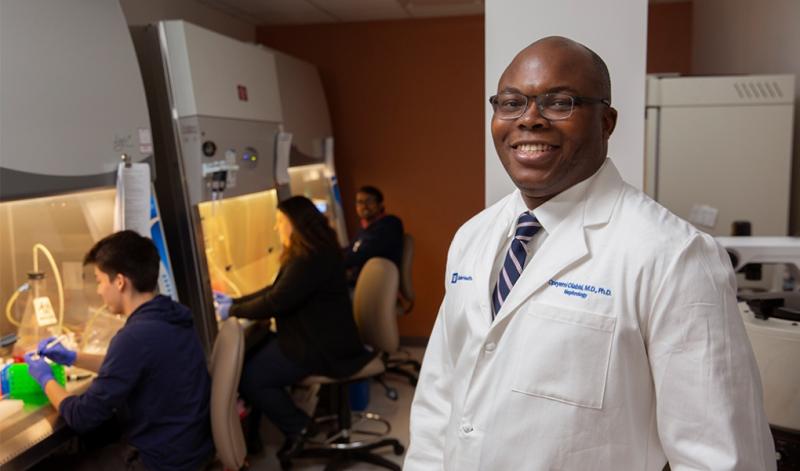
Opeyemi Olabisi, MD, PhD, learned to ride a bicycle when he was 12 years old. He was living in Nigeria in a city called Ilorin, and a friend’s older brother, Yemi, showed him how to keep the wheels moving and the bike upright. That made Yemi an indelible part of Olabisi’s life.
“Everybody remembers who taught them how to ride a bicycle,” he says.
Later, when Olabisi was going to college in New York City, he learned that Yemi had developed swelling in his legs, had gone to see a doctor, and was diagnosed with kidney disease. Yemi was soon on dialysis, and he died before he turned 30.
Both Yemi and Olabisi are from the Yoruba people of western Africa. An estimated 30 percent of Yoruba – and 12 percent of African Americans – have two variants of the APOL1 gene, which can be traced back 6,000 years to a mutation in Africa that provided some protection against sleeping sickness, but also has harmful effects on the kidneys. APOL1 is now associated with high risk for kidney diseases such as focal segmental glomerulosclerosis (FSGS), hypertensive nephrosclerosis, and HIV nephropathy.
Yemi’s kind friendship and early death inspired Olabisi to dedicate his career as a physician scientist to studying APOL1 and to finding a way to treat and prevent kidney diseases.
Olabisi is a rising star who was jointly recruited to Duke University in 2019 by the Department of Medicine and the Duke Molecular Physiology Institute (DMPI) – and he is in a hurry to make an impact in the lives of patients.
People with kidney disease often require regular dialysis, a mechanical intervention for removing excess fluids when failing kidneys can’t adequately do so. But fifty percent of people on dialysis don’t live more than three years. The African-American community is disproportionately affected. While 17 percent of the U.S. population suffering from kidney disease are African American, Olabisi says 30 to 40 percent of the patients on dialysis are African-American. The APOL1 gene is a major contributor to that high number.
“Patients that need therapy can't wait,” says Olabisi. “That's where my sense of urgency comes from.”
Insights from his research could pave the way for innovative prevention and treatment of APOL1-associated kidney disease.
Olabisi was recruited to Duke from Massachusetts General Hospital (MGH) and Harvard Medical School, where he had completed residency and fellowship and joined the faculty. Both his PhD and his MD are from Albert Einstein College of Medicine at Yeshiva University in New York. He joined Duke as assistant professor of medicine in the Division of Nephrology.
After finishing his fellowship training at MGH, Olabisi moved across the Harvard campus to do postdoctoral work in the laboratory of Martin Pollak, MD, chief of nephrology at Beth Israel Deaconess Medical Center. Upon completion of his postdoctoral training, he returned to MGH to set up his own independent research laboratory. He soon began to search for the right environment to expand his research and he was attracted to Duke because of the caliber of people within the Division of Nephrology, at DMPI, and across the institution. And Durham, with its large African-American population – about 40 percent Black – is a community that can both help him advance the science and be served by the knowledge to come.